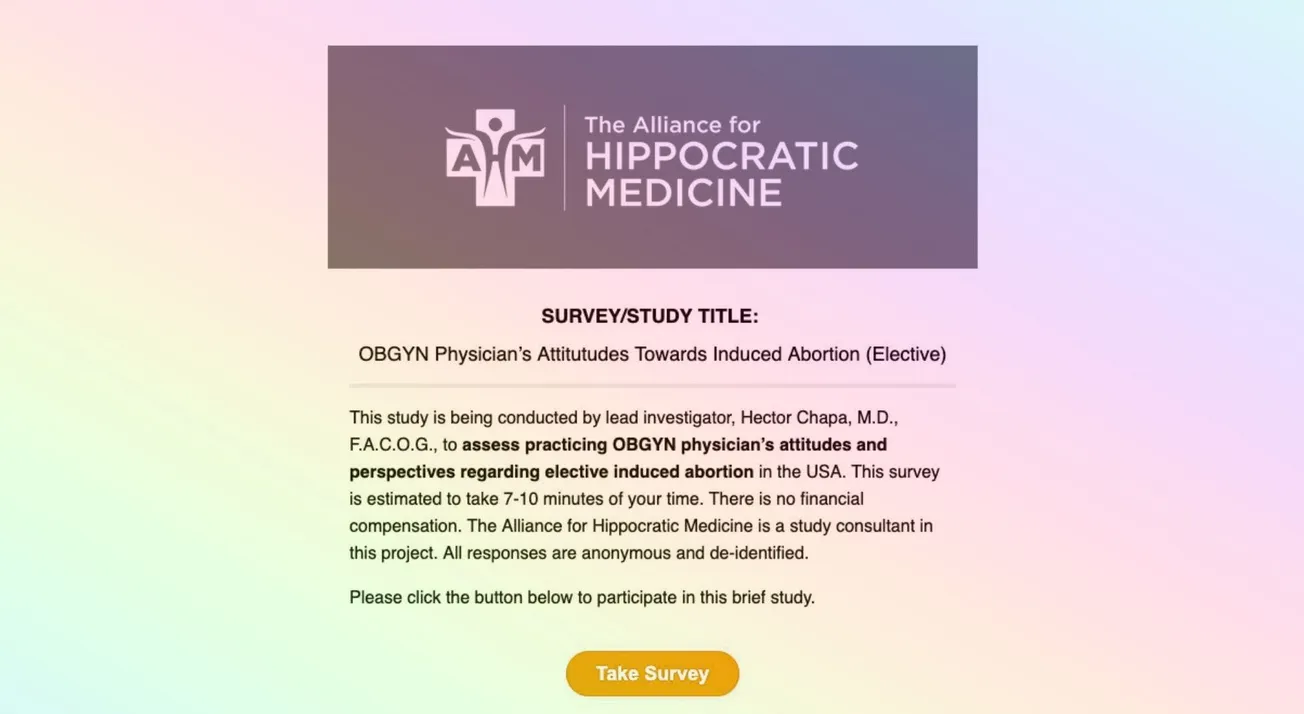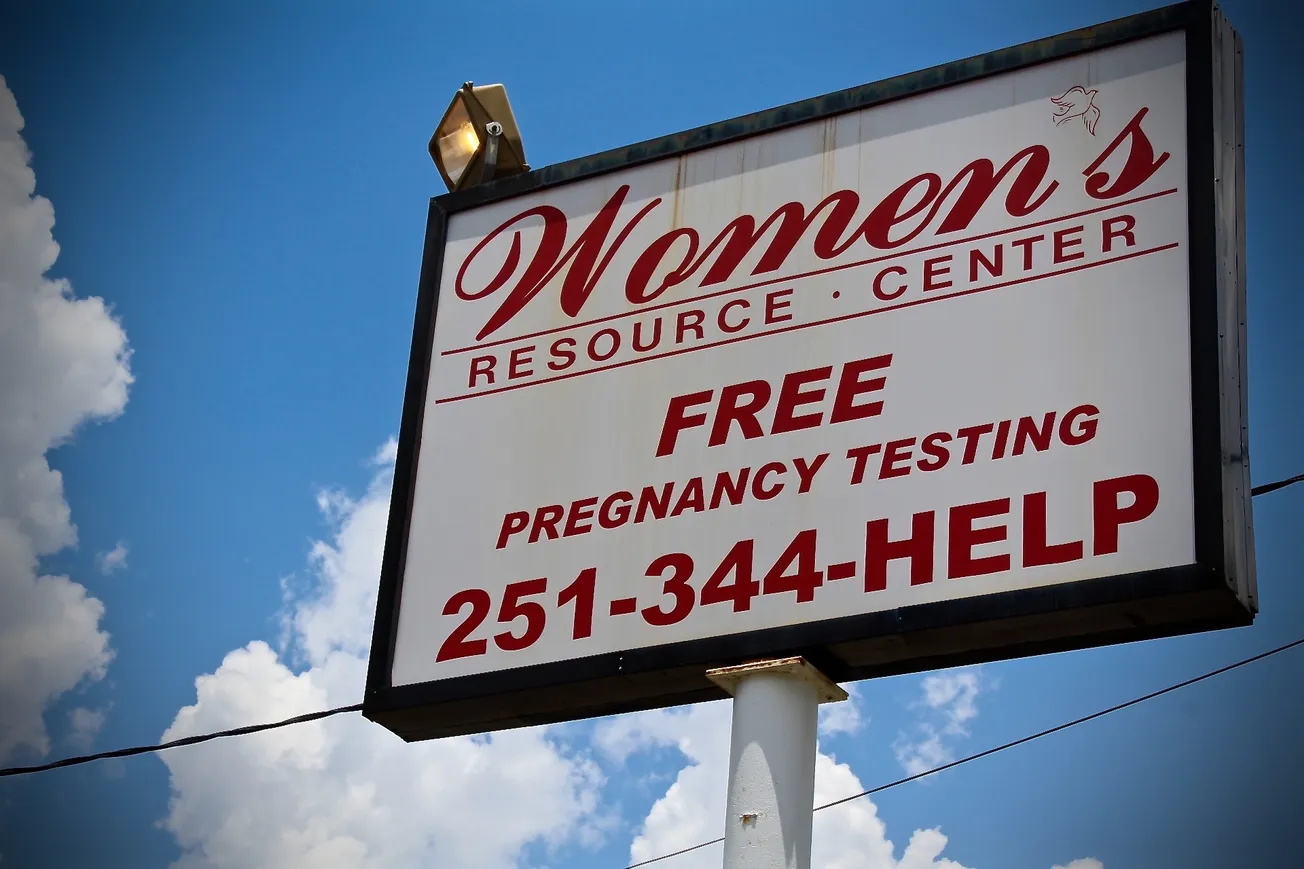One week ago, some OBGYNs received a curious email seeking their participation in a survey about abortion.
The email, sent on July 13, came from the American Association of Pro-Life OBGYNs (AAPLOG), and told doctors the survey was intended to “assess practicing OBGYN physician’s [sic] attitudes and perspectives regarding elective induced abortion” in the U.S. The group said it plans to analyze the results and submit them to a peer-reviewed publication.
However, there’s no indication the survey was approved by an institutional review board—a type of committee that examines the ethical implications of proposals at any reputable research organization. The request comes as abortion opponents are once again using junk science in an effort to restrict access to abortion pills.
Listed as a study consultant is the Alliance for Hippocratic Medicine, the anti-abortion group of doctors and dentists that unsuccessfully sued the Food and Drug Administration seeking to force it to revoke authorization of the abortion drug mifepristone. (AHM lists AAPLOG as one of its partner organizations alongside groups like the Catholic Medical Association and the National Association of Pro-Life Nurses.) Two studies cited in that lawsuit were later retracted.
The email identified the study’s lead investigator as Hector Chapa, a clinical associate professor of obstetrics and gynecology at Texas A&M University College of Medicine—though mention of this affiliation has since been removed from the survey site. Until recently, Chapa had served on the board of American College of Obstetricians and Gynecologists (ACOG). But in May he wrote an op-ed for the anti-abortion site Live Action explaining that he resigned from the role, citing what he described as the organization’s staunch support of “induced abortion” and “the clearly political nature of this ‘apolitical organization.’”
Still, the email implied affiliation with ACOG, claiming the survey is intended to “inform ACOG policy, programming, strategy, and outreach.” A survey website initially claimed that the poll “will go out via an email link through the ACOG of its OBGYN membership,” but that sentence has since been deleted. The site has AHM in the url and bears the AHM logo at the top.
ACOG told Autonomy News that it did not give AHM contact information for its members and sent the organization and Chapa a cease and desist letter. “This survey is unaffiliated with ACOG, and ACOG’s name was being used without ACOG’s consent or involvement,” the organization said in a statement. “ACOG does not have any control over the survey, whether the results are anonymized, or how they will be used.”
“The survey is not being used to inform ACOG policy, programming, strategy or outreach,” the statement continued. “ACOG did send a cease and desist letter to the survey investigator and to the Alliance for Hippocratic Medicine, and we understand that suggestions that ACOG is involved in the study or that the study will influence ACOG's work are no longer being made.”
Autonomy News contacted AAPLOG, AHM, and Chapa for comment, asking where they obtained physicians’ email addresses and whether the survey was IRB-approved. We also contacted Texas A&M College of Medicine to ask whether it was aware of Chapa citing his university affiliation on the survey, and if its IRB reviewed it. (The affiliation was deleted after we sent our request for comment.) We did not hear back from any party by publication time; we will update this story should they comment.
A longer description of the survey says there is “a compelling need for a comprehensive, unbiased, and nuanced understanding of obstetricians-gynecologists’ personal and professional beliefs surrounding abortion.” Yet the email also uses terminology that suggests anti-abortion bias. It reads: “current studies do not distinguish physician beliefs regarding key aspects of abortion, such as medically indicated or elective, dismemberment or intact delivery of the fetus, and medically indicated early delivery vs. true feticide.”
Though not as inflammatory as “dismemberment” or “feticide,” use of the phrase “elective abortion” also raised eyebrows. While the term is still sometimes used in the medical field, researchers and advocates for abortion care have called for an end to this practice for years. “The phrase ‘elective abortion’ should be eliminated from scientific and medical discourse to prevent further damage to the public understanding of the variety of indications for which women require expeditious and equitable access to induced abortion,” wrote the authors of a 2016 commentary in the journal Contraception.
Multiple sources contacted Autonomy News about the survey, with some expressing concern that AHM and AAPLOG might try to use the results to influence abortion policy, or simply identify and mine information about abortion providers. (We obtained the email and survey from multiple physicians to whom it was sent directly.) One source said they have received a few emails from AAPLOG before, but never AHM. This person, who is an ACOG member, said it was “suspicious” that the email references using the information to inform ACOG policy when ACOG didn’t know about the survey and could have conducted its own research.
Not only does the email reference “dismemberment,” the five-part survey itself also asks physicians to account for how many abortions they’ve performed in the last 24 months, and to categorize them by apparent purpose, whether they were due to imminent threats to health, fetal anomaly, or contraceptive failure. The very first question about abortion asks respondents to rate their agreement with the statement “I view abortion activism as integral to being a women’s health professional.” The survey also includes demographic questions that could potentially be identifying, given the relatively small number of OBGYNs who provide abortion care.
![The next three questions pertain to your volume of induced abortion dilation and curettage (D&C) procedures. How many D&Cs or manual vacuum extractions (MVAs) did you in the last 24 months? [answer field] How many of those do you estimate were for imminent threats to maternal organ function or life? [answer field] How many of those were for genetic or anatomic fetal abnormality? [answer field] How many of those do you estimate could be deemed elective (e.g. contraceptive failure)? [answer field] How many D&E procedures were performed electively in the past 24 months without medical emergent or possible emergent condition? [answer field] Would you like to provide comments on your answers? [answer field]](https://www.autonomynews.co/content/images/2025/07/AAPLOG-AHM-survey.png)
Elisabeth Sulger, a New York-based OBGYN and fellow with Physicians for Reproductive Health, told Autonomy News that it’s clear this survey is “highly biased” against abortion access. “It can take months or even years to design studies to be equitable and collect accurate information and data to inform our best practices,” Sulger said. The sort of language used in the AAPLOG and AHM survey “can lead to distorted responses from people that don't realize the undertones, and then that information can, in turn, create false narratives about a really sensitive, highly polarized topic like abortion.”
Sulger added that surveys like this one can feed into attacks on bodily autonomy by potentially creating disinformation. “It's collecting inaccurate data to manipulate the rhetoric around OBGYNs’ opinions or attitudes about abortion,” Sulger said. “It's manipulating the actual medical community against an essential part of health care.”
She also pointed out that when a survey is approved by an institutional review board, it should have an identification number that allows potential participants to look it up and validate its legitimacy—something the AAPLOG and AHM survey lacks. It should also have an informed consent statement explaining not only how responses will be used, but the possible risks and benefits of participating in the study, and details about researchers’ methods. Instead, the AAPLOG and AHM survey merely asks doctors to check a box acknowledging that responses are anonymous and granting permission for their answers to be published.
Sulger did not personally receive the survey, but said several of her colleagues did, including some who received it at personal email addresses. Another source told Autonomy News that colleagues of theirs received the survey at abortion clinic work emails—addresses they thought weren't publicly listed. Abortion providers tend to be mindful of physical and digital security given how often they face threats and violence. For example, Autonomy News previously reported on an apparently fake abortion concierge service that contacted abortion clinics in what the National Abortion Federation (NAF) called a “phishing campaign intended to gather patient and provider information under false pretenses,” as well as controversy over the requirement that abortion providers travel to Texas for a board certification exam on a publicized date.
OBGYN Jennifer Lincoln posted about the survey on social media on Thursday and hinted that people could taint the data by filling it out. But NAF told its members not to take the survey because of AAPLOG and AHM’s “public record of opposing evidence-based abortion care,” as NAF chief program officer Melissa Fowler told Autonomy News.
NAF was worried about the intent behind the survey, Fowler said, and that it “could be an attempt to misrepresent provider perspectives and collect personal and institutional knowledge that could be used to target our members in the future and jeopardize their safety.”
The survey request comes as conservatives rally around other junk science reports to try to pressure the Trump administration to restrict access to abortion. In April, the Ethics and Public Policy Center—a far-right think tank funded by conservative legal activist Leonard Leo, who also serves on its board of directors—released a “study” purporting to show that the abortion drug mifepristone is less safe than FDA data suggests. The analysis was not published in a peer-reviewed journal and has numerous design deficiencies, like counting naturally occurring ectopic pregnancies as a complication of taking the drug.
Sen. Josh Hawley (R-Mo.), whose wife Erin represented AHM before the Supreme Court, urged FDA commissioner Marty Makary to conduct a safety review of mifepristone based on the EPPC report. Health Secretary Robert F. Kennedy Jr. told Hawley at a May Senate hearing that he had directed the FDA to review the regulations, and Makary told Hawley in a June letter that he was “committed to conducting a review of mifepristone.” AAPLOG, AHM, and several other anti-abortion doctor groups sent a letter to the Department of Health and Human Services and FDA earlier this month asking them to restore pre-2016 restrictions on mifepristone, which would limit its approved use to seven weeks of pregnancy instead of 10, and require in-person pill distribution and follow up.
“The bottom line is that people just really have to be careful about ... the kind of content that they're consuming about abortion, contraception, reproductive rights,” Sulger said. “Like we see here, the source is not always reputable, and the data is not always correct."
This story was copy edited and fact checked by Hannah Rappleye.










